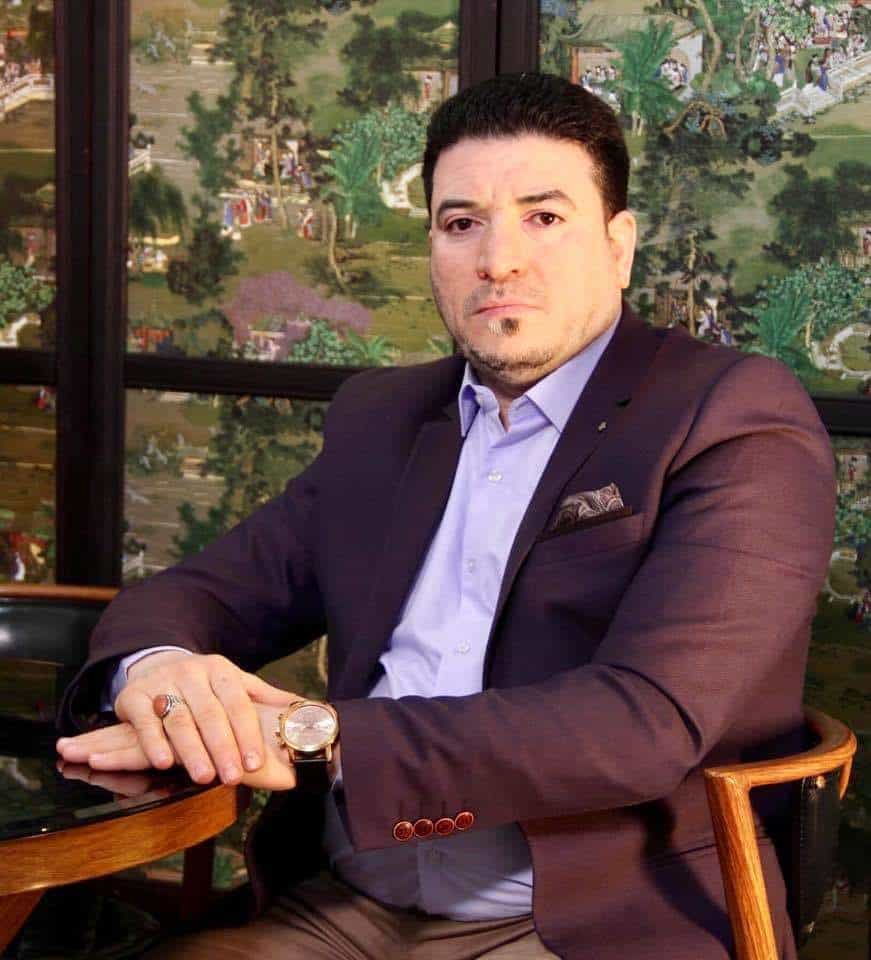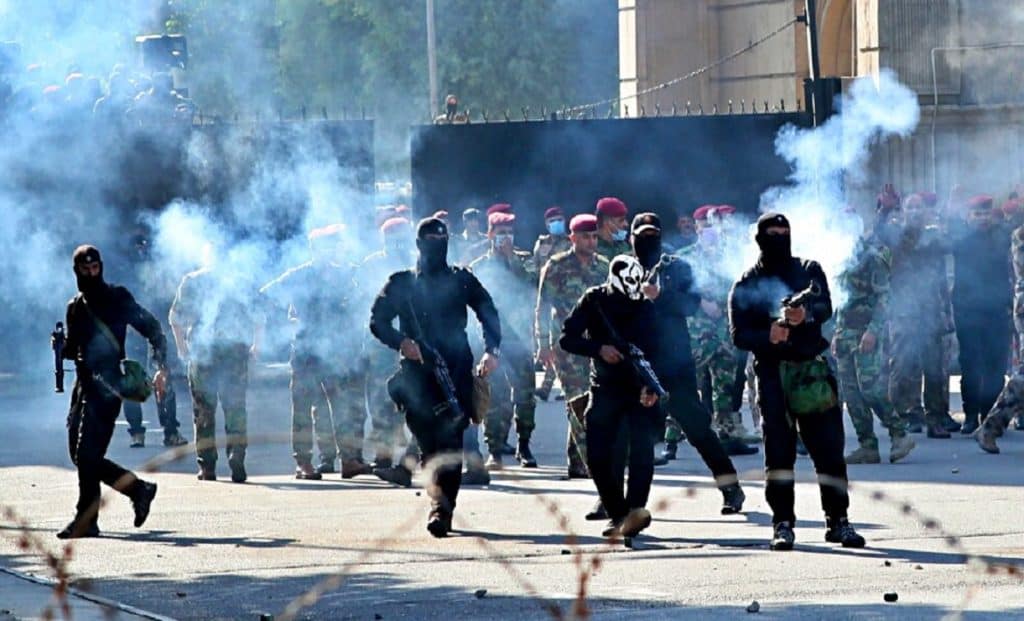Denis Korkodinov – Interview with Abbas al-Ardawi
The resignation of the Iraqi government led by Adil Abdul-Mahdi in Baghdad created a political vacuum. The new cabinet of Iraq will not be formed in the near future due to significant disagreements between political blocs. Meanwhile, social unrest in the country continues to develop exponentially. External forces are trying to take advantage of the situation, and they are training militants to organize a coup. Iraq was one step away from the repetition of the events of 2003.
Specifically for World Geostrategic Insights, we talked about this with Abbas al-Ardawi, Iraqi political expert and national security specialist.

1. On November 11, 2019, the U.S. ambassador to Iraq, Matthew Tueller, made a secret visit to Anbar province, where he met with Sunni volunteers undergoing military training in a camp in the vicinity of Al-Habbaniya. According to sources, Washington intends to use these volunteers to organize riots in Iraq and, above all, in Mosul, which should be the beginning of a new wave of protest movement throughout Iraq. In this regard, do you have any information about the fact that an American training camp is actually functioning in the city of Al-Khabbaniya, where more than 2,000 people are attracted to organize social unrest in Iraq? Does the Iraqi secret service have information that there may be militants in the Anbar province planning a coup in Iraq? Did the US ambassador to Iraq, Matthew Tueller, comment in any way on his visit to Anbar November 11, 2019?
– Yes that’s right. Iraqi intelligence agencies have reliable and complete information about the movements and meetings of the American ambassador Matthew Tueller and his predecessor John Goode with the leaders of Iraqi tribes, media activists and military personnel. Such meetings were held in Erbil, as well as in Mosul, Anbar and Al-Hadaf. In addition, we know that currently the number of armed militants in Mosul is 2,000, while in Anbar there are 2,500 people who undergo military training to organize social unrest in Iraq. This activity is carried out by US representatives in order to weaken the power of official Baghdad and the regular army and fully coincides with the plans of the White House administration to change the political regime in Iraq.
Unfortunately, the American ambassador Matthew Tueller has so far refrained from any comments, hiding behind diplomatic immunity. But all the activities that he has been conducting in Iraq recently, allow him to be declared persona non grata, since he clearly undermines the sovereignty of our country. In any case, the Iraqi secret services monitor his every movement. Therefore, we know about all his plans.
2. On December 3, 2019, a closed meeting of the leaders of the political establishment of Iraq and regional allies was held in Baghdad in order to find a way out of the political crisis and the formation of a new Iraqi government after the resignation of the country’s Prime Minister Adil Abdul-Mahdi. The meeting was attended, among other things, by the commander of the Revolutionary Guard of Iran, Major General Kassem Soleimani and Lebanese General Mohammad Kautarani, representing the Hezbollah movement. What decision was made as a result of the meeting? What difficulties may arise in the process of organizing early elections in Iraq?
– Not a single official source of Iraq reported this meeting, which took place on December 3, 2019 in Baghdad, since this meeting was a secret. But, apparently, this is not a problem for Russian intelligence, since Moscow quickly receives reliable information from all parts of the world.
Kassem Soleimani held many meetings in Iraq with representatives of local political parties.
Among other things, there were meetings with the chairman of the Supreme Judicial Council to try to legally adapt some of the country’s legislative acts to the current crisis and find a constitutional solution. Iran, of course, supports the continuation of the democratic process and seeks to ensure stability in Iraq, since everything that happens in our country is reflected in the security of the Ayatollah regime. For this reason, Kassem Soleimani and other senior representatives of the Islamic republic show great interest in the domestic political crisis that swept Baghdad.
There are no difficulties in holding early elections, but there is also no real desire for the political blocs to hold these elections.
The Iraqi leadership proceeds from the view that adhering to the transitional period is important for the consolidation of democratic actions and the peaceful transfer of power without establishing a political dictate.
As for the popular aspect of reforms, that is, the desire to change the election law and the election commission. For this, a number of proposals were submitted by the Iraqi Parliament Legal Committee. And these proposals are discussed in parliament with the aim of amending the law.
3. Some Iraqi politicians made a statement that criminal proceedings could be instituted against Adil Abdul-Mahdi, and he himself was imprisoned on corruption charges. How likely is this scenario to be implemented?
– Adil Abdul-Mahdi was the Prime Minister of Iraq. And only on this basis, he, along with all structures and departments that were subordinate to him, bears full responsibility for the political decisions made and the reaction to them on the part of society. Meanwhile, there is no information in the Iraqi government that they want to bring him to trial. However, such information is actively disseminated by his opponents in order to exert political pressure. However, this is only an instrument of political pressure, which is based on false information.
4. More recently, tribal leaders in the Iraqi province of Di-Kar demanded that the security forces and police leaders responsible for the killing of demonstrators in Nasiria be held accountable. This requirement represents a new stage in the development of the protest movement in Iraq, since the call of tribal leaders can be perceived as an occasion for the massacre of Iraqi troops participating in the suppression of protests not only in Nasiriya, but also in other cities of Iraq. At the same time, tribal leaders calling for reprisal are convinced that the United States is guilty of organizing social unrest in Iraq. This significantly complicates the situation, as popular anger can spread to the US military. What do you think about this? How likely is it that after the demand of the leaders of the Iraqi tribes, the situation in the city of Nasiria can be significantly complicated, as a result of which this city can become the epicenter of a civil war?
– Arab tribes in central and southern Iraq are very close to the supreme religious authority in Najaf al-Ashraf. Therefore, they do not contradict religious directives that reject any violence. These tribes provide stability in the Di-kar governorate (Nasiriya) and control the Al-Haut prison, where more than 4,000 ISIS are currently located. But when some corrupt security forces decided to organize provocations in the area, tribal leaders were outraged, because all of Iraq could suffer from these provocations. In particular, if the tribes are distracted by clarifying relations with the security forces, there is a risk that there will be no one to guard the Al-Haut prison. And then the ISIS fighters will have the opportunity to escape, which cannot be allowed.
It is worth noting that tribal leaders did not call for reprisal. They simply made an official appeal to leave their region alone to give the Islamic State a chance to take advantage of the situation. And this is the right decision. Di-Kar Governorate must not be touched.
5. One of the most influential candidates for the post of Prime Minister of Iraq after the resignation of Adil Abdul-Mahdi is Hadi al-Ameri. However, according to sources, his candidacy may provoke sharp resistance from Tehran, who would like to see in the post of head of the Iraqi government a more loyal person than Hadi al-Ameri. Does this mean that the appointment of Hadi al-Ameri as Prime Minister of Iraq could provoke new social unrest?
– Despite the fact that a number of information sources indicate Hadi al-Ameri as the successor to Adil Abdul-Mahdi, this information is not true. Hadi al-Ameri did not stand as a candidate for the post of Prime Minister of Iraq. Moreover, he is not an influential figure in Iraq. He made a political career in 2014 when he took part in the liberation of Mosul and the fight against ISIS. But on this his mission was completed. And by agreement with Ayatollah Muktad al-Sadr, the post of head of the government of the country went to Adil Abdul-Mahdi, which made Hadi al-Ameri jealous.
Now, when Adil Abdul-Mahdi resigned, Hadi al-Ameri decided to remind himself. However, he is unlikely to succeed, because the political reality of Iraq is such that the selection of candidates for the post of prime minister of the country requires the approval of the highest priests, including Muktada al-Sadr, who ignores Hadi al-Ameri. This could trigger new protests.
Image Credit: Associated Press (AP)







